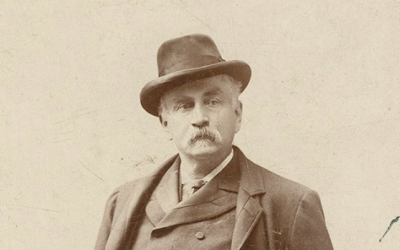Nebraskans must have read with interest of “the latest political ‘fake,'” in the Lincoln Daily Call on March 2, 1890. The “fake” was an alleged scheme to “cut Nebraska in two parts-the eastern half to be called Nebraska and the western half Centoria.” [Centoria was also the name of an early Kearney County settlement, once fancifully proposed as a site for the national capital.]
The Call, dubious from the start about the proposed division of the state, said: “A reliable (?) authority says that there were a number of the leading politicians in the scheme and that it was being fostered by congressman [G. W.] Dorsey, who was thereby gathering strength to secure a nomination. The dividing line was to be north and south, just east of Kearney, leaving that city the metropolis of the new state. . . . It is mighty lucky that some of them don’t take Nebraska and secede from the union with it.”
The next day, on March 3, the Call published an interview with John T. Mallalieu of Kearney, superintendent of the state industrial school there, who expounded on the proposed new state of Centoria: “‘I presume you fellows in Lincoln believe this Centoria business a fake. Now I want to disabuse your minds on that subject and to assure you that to many people in the western part of the state it is a solid reality, and that it has been a wild-eyed dream of theirs for a number of years. . . .
“‘And, coming down on the train today, I met a number of gentlemen from the western counties and when they saw me, they immediately began the conversation, and each pulled from his pocket a map on which a heavy dividing line had been drawn north and south through the state, just east of Buffalo county. Many of them had even got beyond the point where they would discuss the feasibility of the question. That it was to be was fully settled in their minds. So deep rooted has this sentiment become in some parts of the west that I am not sure but that THE CALL had better let up on it, or that the question might have to be confronted in our state conventions and legislative halls in the near future.'”
A subsequent spoof on Centoria in the March 5 issue of the Call, included a purported conversation between J. M. Lee of Oxford and Tobias Castor. Lee supported the plan to divide the state, because as a prohibitionist, he feared that “wet” votes in eastern Nebraska would defeat a proposed prohibitory amendment to the state constitution. [The amendment was defeated that November.] Castor, a Burlington Railroad official, told Lee that he depended on the Lincoln Land Company, a Burlington affiliate, to “‘see that the new capital city [of the state of Centoria] is located where it will do [me] the most good, . . . I tell you there’s millions in it.'”
The Call ended its coverage of the proposed new state with another jab at Castor, who was reported to have told Lee, “‘There’s another thing I am interested in and that is the name. I have had an ambition to leave a name that would live through all eternity. . . . I shall insist that this new state shall do me honor, and I propose the name of Castoria instead of Centoria.'”



